The Hill’s Latina Leaders to Watch

The Hill presents Latina Leaders to Watch in Washington. Photos by Victoria Sarno Jordan.
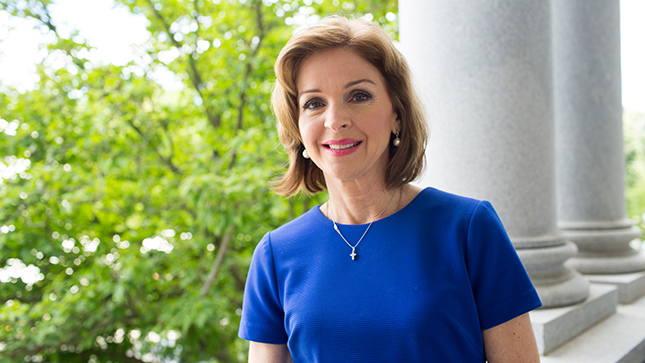
Helen Aguirre Ferré
Helen Aguirre Ferré has one of the toughest jobs in President Trump’s White House: packaging and selling his message to the nation’s Latino community.
But to hear Aguirre Ferré tell it, it’s a job she was born to do.
“Communications is something that has been a part of my life since inception,” she said.
The Miami-born adviser has deep roots in the news media: Her Nicaraguan-exile father co-founded the Spanish-language newspaper Diario Las Américas, and for years she was a well-known bilingual media personality in South Florida.
She left the news business during the 2016 presidential campaign to work for former Florida Gov. Jeb Bush, moving over to the Republican National Committee and then to the White House.
{mosads}Aguirre Ferré, 59, now serves as the White House’s director of media affairs, putting her in charge of outreach to Latino and African-American news outlets, as well as local and regional media organizations that Trump’s staff is targeting.
But her background and previous criticism of Trump have opened her up to accusations from some of the president’s supporters that she isn’t sufficiently committed to his cause, a notion she dismisses.
“My friends always knew that I’m a very strong Republican; they had always known that I would not be supportive of Hillary Clinton,” she said. “Friends are friends, and that doesn’t change at all.”
Aguirre Ferré says she was able to see Trump’s appeal during the campaign, in which she points out he surpassed the past two GOP presidential nominees in Hispanic support.
“Because I was able to travel quite a bit, it was very clear that people from all over and all ethnic backgrounds were looking for something very different in a political candidate,” she said.
Aguirre Ferré starts her day at 5:30 a.m. and faces the daily task of working with news outlets that were critical of Trump’s comments about undocumented immigrants during the campaign. But she says she relishes the challenge of working in the high-pressure environment of 1600 Pennsylvania Ave.
“No two days are alike, and that’s what makes it magical,” she said.
—Jordan Fabian

Rep. Nanette Barragán
There’s a sure way to light a fire under Rep. Nanette Barragán: Just tell her she can’t get what she’s after.
The freshman California Democrat has fought against the tide — not to mention her own party establishment — to squeak out long-shot victories in local elections and, most recently, November’s hard-fought contest to replace former Rep. Janice Hahn (D-Calif.), who retired after last year.
Barragán’s opponent was a veteran state senator endorsed by Hahn, California’s governor and the Democratic Party. But the 40-year-old Barragán has embraced the role of underdog and taps it as a driving force. It’s a formula, she says, informed by her life.
“It was somebody always telling you, ‘You can’t do that because,’ she said. “ ‘You can’t do something because your parents are immigrants, or because they have no money, or because my mom had a third-grade education.’
“It was the story of my life, beating the odds.”
The youngest of 11 children, Barragán was raised in Los Angeles County by working-class parents who immigrated from Mexico and benefited from public assistance programs — a childhood experience that led her into public service.
Barragán put herself through law school at UCLA, and after stints with the Clinton White House, the NAACP — and then nearly a decade as “a big-firm lawyer,” in her words — she moved to Florida in 2012 to work on the Obama campaign.
“That was really the linchpin moment,” she said, “because when I got back I said, ‘What can I do locally to give back and to get involved?’ ”
The answer was to become the first Hispanic woman ever elected to the Hermosa Beach City Council. Last year, she was the only new Latina to join the House.
“I always tell young women, especially young Latinas, ‘Don’t let anybody tell you you can’t do something. Use it as a motivator to work harder,’ ” Barragán said.
— Mike Lillis
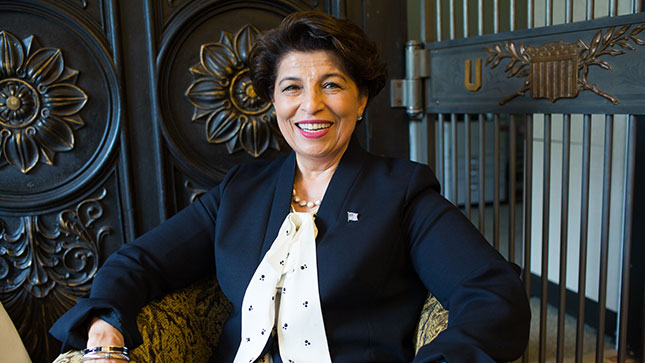
Jovita Carranza
As treasurer of the United States, Jovita Carranza is looking forward to helping President Trump advance his goal of creating more economic growth.
Carranza started in her position in late May after being appointed by Trump, and since then she’s hit the ground running.
“It’s been really exciting and quite dynamic, as you can imagine,” she said.
The treasurer oversees the U.S. Mint and the Bureau of Engraving and Printing and also works on community development and public engagement matters. Several other Latinas have previously held the position.
“I’m very focused on financial literacy, and that’s going to be a big platform I’m going to be participating in,” Carranza said.
Hispanic-owned firms are the fastest-growing segment of U.S. small businesses, according to Small Business Administration (SBA) research, and improving financial literacy, tax reform and regulatory reform can be helpful for small-business owners, Carranza said.
These priorities are “essential to create economic capacity,” she said.
Carranza was born and raised in Chicago and had a blue-collar upbringing. She had a lengthy career at UPS, starting by loading trucks and eventually serving as president of the company’s Latin America and Caribbean operations, which made her the highest-ranking Latina in UPS history.
During President George W. Bush’s administration, Carranza served as deputy administrator at the SBA. Prior to joining the Trump administration, she founded a firm called The JCR Group, which advises companies and nongovernmental organizations, and served on the boards of several nonprofits.
Carranza said that representing the Hispanic community comes with a lot of responsibility. “I don’t take it lightly,” she said.
— Naomi Jagoda
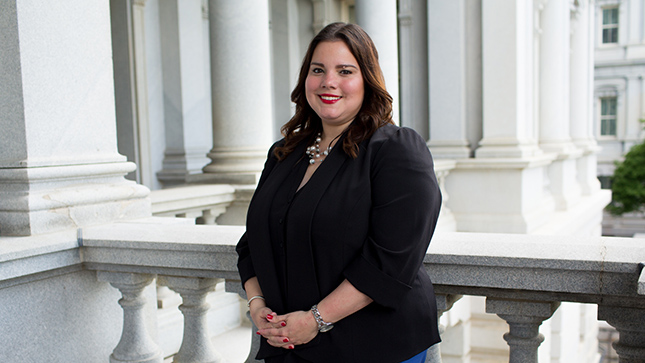
Andeliz Castillo
Meeting with Vice President Pence? There’s a good chance Andeliz Castillo helped make it happen.
Castillo serves as the vice president’s deputy director for public engagement and intergovernmental affairs, a key emissary to a variety of groups representing people of different races, creeds and political viewpoints.
“The VP is very, very active and loves engaging with the public, traveling and hosting events,” she said in an interview. “I definitely do not have a typical day. Every day, there’s never really downtime.”
The New York City native first met Pence after the 2008 election, when she was hired by the House Republican Conference to spearhead its minority outreach efforts. Pence led that group before leaving Congress to run for Indiana governor.
Her career has taken her all over Washington, from stints at the Republican National Committee and the office of Rep. Ileana Ros-Lehtinen (R-Fla.), to the Libre Initiative, a Charles and David Koch-backed conservative group tasked with engaging with Latinos.
Castillo says her Cuban-born grandfather, who lived across the street from her growing up in Manhattan’s Washington Heights neighborhood, was her greatest influence in introducing her to politics.
Although she now works in the White House, Castillo said her conservative viewpoint has made it tough to establish professional connections with other Latinos in the political world.
When she discussed her political views at networking events on Capitol Hill, Castillo recalled that “some people kind of turned around and walked away.”
“That has been an interesting dynamic in particular with other Hispanics,” she said. “There has been at times some prejudgment from Hispanic Democrats or liberals.”
But Castillo said that hasn’t dampened her enthusiasm for her work.
“Throughout my career, I have worked closely with the Hispanic community, and I love that I have the opportunity to continue to do so in my new role,” she said. “I also value getting to work with a broad spectrum of communities and organizations representing various voices of our country.”
— Jordan Fabian

Daniella Diaz
Daniella Diaz first discovered her love for journalism while writing poems as a young girl.
“I’ve always loved writing,” says Diaz, 25, a digital breaking news reporter for CNN Politics who works from Capitol Hill.
“When I was young, I’d doodle and write poems in composition notebooks without realizing it was something that I could fruitfully do for the rest of my life.”
After joining the school newspaper at the University of Texas, she discovered her love for reporting hard news.
Diaz, who is fluent in Spanish and conversational in French, says her favorite part of working in journalism is “being able to watch history in real time.”
“There’s nothing more amazing than telling people’s stories,” says Diaz. “There are people all over the country whose lives are really impacted by the policies in Washington — including the people from South Texas where I am from.”
Diaz had an up-close view for President Trump’s campaign, his inauguration and his first 100 days in office.
“I also love being able to watch history happen in real time,” she said. “Political reporters get to cover history as it unfolds, and I love what I do.”
— Joe Concha
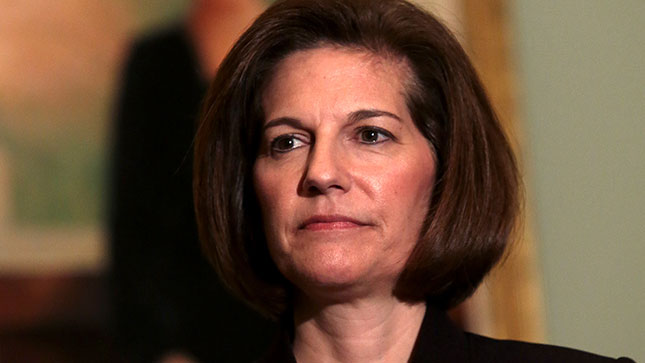
Sen. Catherine Cortez Masto
Sen. Catherine Cortez Masto (D-Nev.) broke a glass ceiling as the first Latina ever elected to the U.S. Senate.
But as a finance major in college, she never expected to hold high political office.
“Believe it or not, I wanted to work on Wall Street, and it just did not pan out,” the first-term senator said.
After graduating from Gonzaga University School of Law, Cortez Masto became a civil litigator in her home state of Nevada. She then moved to Washington, D.C., as a U.S. attorney, where she worked in a domestic violence court.
That experience focused her on the issues that have marked her public career.
“Because of the domestic violence court, there’s a credible system, a wrap-around system, both of prosecutors, public defenders, advocates and the judges, all just focused on the needs of the victim,” Cortez Masto, 53, said.
As an assistant county manager in Nevada, she pushed for the creation of a domestic violence court like the one she’d worked for in Washington, but the county didn’t have the resources to follow through.
That’s when she decided to run for attorney general of Nevada.
“There were a lot of issues that we were dealing with … and felt, you know what? It’s time to take a lead on issues that I cared about and try to get something done.”
Cortez Masto used her position, through litigation and legislation, to address issues such as juvenile justice reform, sex trafficking, drug treatment, senior exploitation, identity theft and domestic violence prevention.
She credits her parents’ work ethic for her drive, and her family’s struggles for her focus on social issues.
“My father, the struggles that he had growing up, that’s why he gave back,” she said of her Mexican-American father. “To me he is the success story … he is the American dream.”
— Rafael Bernal
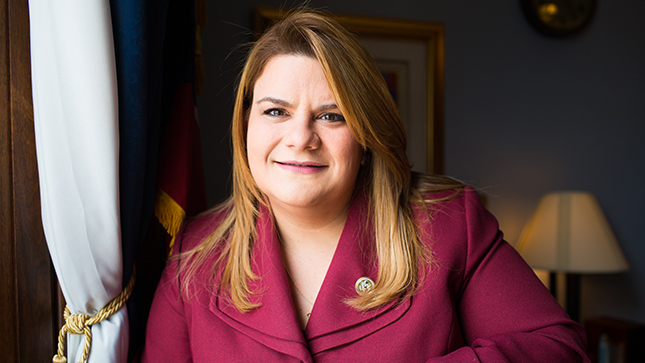
Jenniffer González-Colón
Puerto Rico Resident Commissioner Jenniffer González-Colón (R) is the youngest person and first woman to be elected to her position.
An activist since high school who pushed for the “decolonization” of Puerto Rico, she says she never expected to hold political office.
“I’ve always lived carpe diem, thinking of every day as if it were the last,” she said. “I impose goals upon myself, and until I deliver I don’t look elsewhere.”
González-Colón, 40, ran for Congress promising to mount a realistic charge for statehood.
She’s made that issue central to her tenure in Washington, while dealing with Puerto Rico’s considerable financial woes.
Although she’s a freshman in Congress, she has already established a strong rapport with leadership. Speaker Paul Ryan (R-Wis.) named her to the Task Force on Intergovernmental Affairs in May.
A lifelong Republican, González-Colón is the chair of the Puerto Rico Republican Party, vice chair of the pro-statehood party in Puerto Rico and a member of the Republican National Committee.
She’s a small-government, pro-business conservative who’s unafraid to speak out about the limited political rights of Puerto Ricans.
“I can vote in primaries but I can’t vote in general elections, like the 3.5 million citizens on the island,” she said. “They can go to war, but they can’t vote for their commander in chief.”
Like many Puerto Rican Republicans, González-Colón views statehood as the ultimate goal to achieve full U.S. citizenship.
“It’s time to resolve that, otherwise mass migration to [the states] will continue,” she said.
González-Colón received 728,000 votes in her last election and represents nearly 3.5 million people.
“Here, most representatives are elected with an average of 250,000 votes,” she said. “Of course, they represent about 750,000 constituents.
“I’m the congresswoman who doesn’t have a right to a floor vote, but who represents more American citizens than any other member,” she added.
González-Colón’s direct style has turned her into a political force in Puerto Rico, but she always prioritizes respect and negotiation in politics.
“Dialogue will always be more effective than fighting. Now, when there’s no space to establish that dialogue, that doesn’t mean I’m not ready for battle,” she said. “And the people of Puerto Rico know it.”
— Rafael Bernal
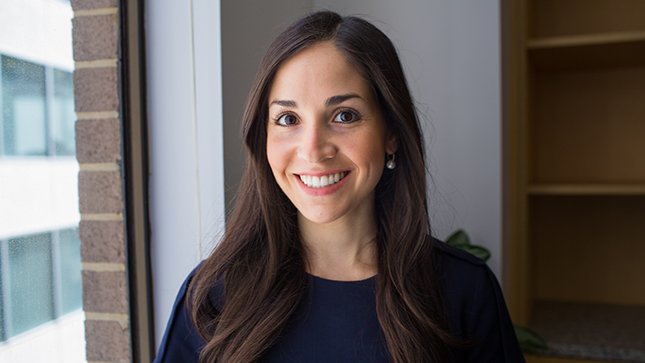
Ruth Guerra
Ruth Guerra was tasked last year with one of the most challenging jobs in the country: heading Hispanic communications for the Republican National Committee during the 2016 presidential primaries.
Guerra, the RNC’s sole bilingual spokeswoman, became the face of the party on Spanish-language news at the age of 28.
Guerra, who balanced the party’s interests with the rise of Donald Trump in a 17-candidate field, describes what some might have seen as a challenging scenario as a “blessing.”
Now 29, Guerra started out in politics volunteering for Sen. John McCain’s (R-Ariz.) 2008 presidential campaign in Dallas after growing up in McAllen, Texas.
That experience set her on the path to Capitol Hill, where she took jobs for members of the House Texas delegation.
But Guerra’s career in communications took off when she became communications director for Rep. Mario Diaz-Balart (R-Fla.).
“It kicked it off pretty fast given that Miami is a strong media market not only in English but also Spanish,” she said.
Guerra’s strong command of Spanish was a key element in her fast rise. Her parents required the four Guerra sisters to speak the language at home.
Now the communications director for the Congressional Leadership Fund, a PAC associated with Speaker Paul Ryan (R-Wis.), and its policy arm, the American Action Network, Guerra has made the jump to mainstream political communications.
Guerra says her Hispanic media experience is a valuable asset in her new role.
“I was taking with me those contacts and connections I have with Hispanic media … That was one of the most important things I took into consideration when I accepted a new role,” she said.
Guerra says her role is important to close the opportunity gap for Hispanics, regardless of their political leanings or background.
“We’re all Americans, and we all care about the economy and education and national security.”
— Rafael Bernal

Rep. Jaime Herrera Beutler
Rep. Jaime Herrera Beutler (R-Wash.) revels in casting aside preconceived notions about her political identity.
“It’s fun because being from Washington State, a much more blue state, people see me coming, young, female, Hispanic, you’re gonna be a liberal, right?”
“Actually, I’m not. I firmly believe in limited government, personal responsibility, which breeds choice and the ability to be in control of your own destiny,” she said.
Herrera Beutler’s short political career has seen her rise quickly from a White House intern under former President George W. Bush to a four-term member of Congress.
She pursued the idea of holding political office from an early age, when her mother took her and her brothers on yearly trips to the state Capitol and to town meetings as part of their civic education.
“I just fell in love with the idea of our republic and serving in some fashion. I knew early on that I’d like to run for office,” said Herrera Beutler, 38.
As a college student at the University of Washington, Herrera Beutler joined Republican clubs and sought out internships.
“For me it was literally meeting people. It was volunteering; it was doing internships. I really just said, ‘What is an opportunity to get me where I wanted to be in terms of being involved in this amazing process?’ ” she said.
That mentality took her to the White House and then to the Hill as a staffer for Rep. Cathy McMorris Rodgers (R-Wash.) working on healthcare, one of Herrera Beutler’s core issues.
Although Herrera Beutler was on track to fulfill her dream of serving in elected office, she didn’t expect it would happen so soon.
In 2007, her home-district state representative suddenly resigned.
“Cathy [McMorris Rodgers] told me, ‘I know you’re interested in doing this someday. Basically, consider that someday could be now,’ ” said Herrera Beutler.
After three years in the state legislature, Herrera Beutler was elected to Congress.
She says her background representing the district she grew up in has a strong influence on how she sees the political world.
But she also expects to leave her own mark.
“Overall, on behalf of the people I serve, and also as a young woman and a mom with young kids, I think what I bring in terms of perspective to my party at this point in history is critical.”
— Rafael Bernal
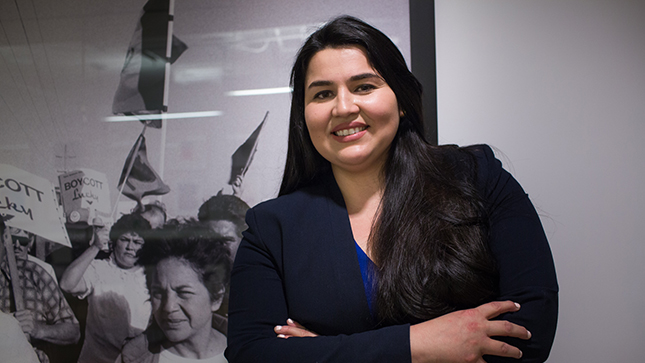
Lizet Ocampo
After years focused on lawmaking, Lizet Ocampo has shifted her sights to lawmakers.
As political director at People For the American Way, Ocampo is leading the group’s efforts to recruit and elect young progressives seeking office at all levels of government nationwide.
She has her work cut out for her.
By Ocampo’s tally, Democrats have lost more than 1,000 offices — state, local and federal — over the last eight years. Her task is to identify the causes and reverse the trend.
“It’s definitely been an opportunity to take a look at what’s happened and realize there needs to be more investment on the state and local level,” she said. “And we’re committed to do that.”
Ocampo, 33, hails from a tiny agricultural town in northern California, where her parents, both Mexican immigrants, worked in the farm industry. That upbringing lent her “a very rich perspective and a very strong passion for the work that I do,” she said. “Because I know how intimately it impacts people across the country and especially the most vulnerable people.”
Initially, that meant delving into policy issues, both on Capitol Hill, where she worked in the offices of Sen. Bob Menendez (D-N.J.) and Rep. Steny Hoyer (D-Md.), and in the Obama administration, where she liaised with Congress as part of the White House office of legislative affairs.
Being a Latina in Washington, she said, is no small challenge.
“It is kind of like a boys club,” she said. “There are constant challenges to overcome as a woman in politics, especially when you reach more senior levels, and as a woman of color in particular.
“There are not many of us in this type of work.”
President Trump’s victory has fueled liberals’ interest in being engaged, “but there’s also a lot of need,” Ocampo said.
“We have a lot of work to do.”
— Mike Lillis

Domenika Lynch
Domenika Lynch came to the Congressional Hispanic Caucus Institute (CHCI) one year ago with big goals and an urgent message.
“We are living in a defining moment in history,” she said, “[and] it is imperative that we invest and launch Latino leaders who are prepared to address the problems of the future.”
Over the last 12 months, the 43-year-old Lynch has sought to do just that with a focus on expanding the CHCI’s collaborative enterprises and social outreach efforts — an endeavor that includes a close coordination with Rep. Joaquin Castro (D-Texas), the CHCI chairman, and other members of the Congressional Hispanic Caucus (CHC).
“It’s become my life’s work,” she said.
Founded almost 40 years ago as the CHC’s community-outreach arm, the nonprofit CHCI aims to empower young Hispanics and forge them into the next generation of leaders across the professional spectrum.
The focus is education — largely through the promotion of internships, fellowships, and scholarships for both high school and college students. But in a show of its scope, the CHCI this month honored Norman Lear, the legendary television producer, for promoting diversity in the arts.
“We know that across industries, Latinos are not represented,” she said, “and certainly Hollywood is one.”
Lynch is no stranger to promoting education opportunities for Hispanics.
Prior to joining the CHCI, she spent 10 years heading the Latino Alumni Association at the University of Southern California, her alma mater, where she oversaw the disbursement of nearly $1 million in annual scholarships to Hispanic students.
Lynch is also well versed in the corporate and media worlds, having served as an executive at Bank of America and Univision Communications Inc.
Her goals have few limits.
“The foundation of the American dream is having a solid education,” she said. “Ultimately, we’d like to have the first Latino president.”
— Mike Lillis
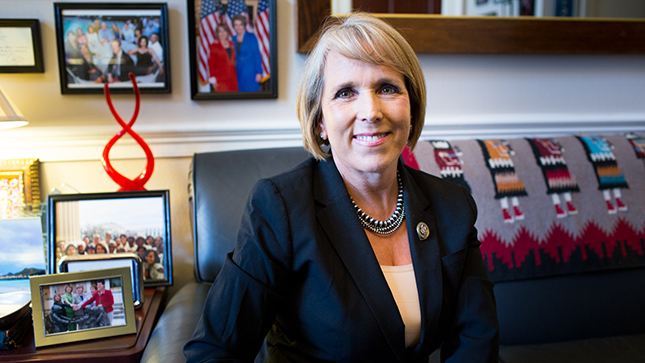
Rep. Michelle Lujan Grisham
Rep. Michelle Lujan Grisham’s (D-N.M.) personal experience with long-term home care has driven her political ambitions since she first entered public service as the director of New Mexico’s agency for elderly care.
Lujan Grisham, the chairwoman of the Congressional Hispanic Caucus (CHC), started her political career balancing motherhood, politics and care for her sister, who became disabled as a result of a brain tumor at an early age.
As a law school graduate, Lujan Grisham found that she didn’t fit the mold for a traditional career in a law firm.
“There’s a very specific recruitment pattern for young lawyers, and I was just outside of it for a multitude of reasons. Married, two kids, working full time, straight out of law school,” she said.
In order to pay off her New Mexico bar dues, she started working for a state program giving legal services for the elderly.
“That program changed my life in an instant,” said Lujan Grisham, 57.
In that program, she noticed gaps in services for the elderly, especially those confined to home care, who couldn’t drive themselves to state senior centers.
Although she’s a member of one of the most prominent political families in New Mexico, at that time, Lujan Grisham didn’t have the network to make a case to help those seniors.
“The truth is I knew all about these family connections, but I didn’t make the personal connections,” she said.
“I was confident enough, probably foolish, maybe? I just marched into the governor’s office and said I need to be appointed as the next director of aging, primarily because the current director refused to meet with me.”
Then-Gov. Bruce King (D) received her and eventually decided to appoint Lujan Grisham to the post she’d requested.
Since then, Lujan Grisham, who is running for governor in 2018, has brought long-term healthcare issues — an often-overlooked area of healthcare that primarily affects veterans, the disabled and the elderly — to the national stage.
“When you live it, it’s an issue that’s affected you, I think you’re in the best position to highlight it, address it and encourage others to participate in making a difference,” she said.
— Rafael Bernal
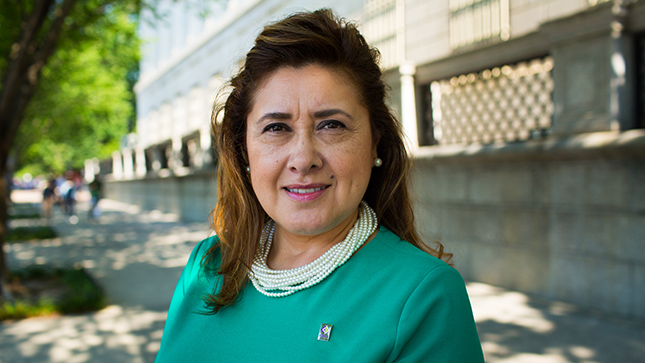
Mary Ann Gomez Orta
Mary Ann Gomez Orta is laser-focused on a single goal: She wants Hispanics to succeed.
The head of the Congressional Hispanic Leadership Institute, Orta leads the nonprofit group’s efforts to steer Hispanic high schoolers into college while preparing Hispanic collegians for the next step, be it in business, academia or public service.
Toward that end, Orta oversees a range of programs — from internships to scholarships to conferences on the Hill — designed to mold Hispanic students into the next community leaders.
For Orta, 50, education is a natural calling.
The eldest of five children, Orta was raised on a farmworker camp in California’s Central Valley by a Mexican-born father and a mother from a Texas border town. Both parents worked in the fields and instilled in their kids the idea “that education was the way to go and what was going to give us the platform to make other life-changing decisions and opportunities for our own families,” Orta said.
“So I just kind of kept that going.”
All five kids earned college degrees.
Orta is well suited for the role of outreach guru: She spent years in public relations and corporate marketing, including stints with the Coors Brewing Company and the McDonald’s Corporation. Those, she said, were “very male-dominated industries” — a taxing dynamic for a Latina trying to overcome “all the different stereotypes that people have.”
“The majority of the major corporations are run by men; the majority of the elected officials are men,” she said. “You find yourself in a situation where you’re the actual, live person that’s breaking those barriers.
“They’re not used to seeing someone like me.”
— Mike Lillis
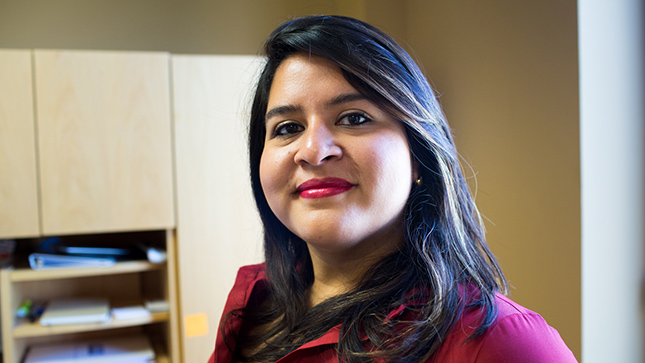
Lorella Praeli
Lorella Praeli knows a thing or two about adversity.
The Peruvian-born immigrant rights advocate lost a leg in a car accident at age 2 and a half, and later spent more than a decade living in the shadows as an undocumented immigrant.
Now a U.S. citizen, Praeli joined the American Civil Liberties Union (ACLU) in April as director of immigration policy and campaigns, a post that puts her in charge of the group’s advocacy efforts on the state and federal levels. Her task, she said, is no less than “to defend and advance the rights of immigrants across this country.”
“We have to show up every day and use every tool at our disposal to fight every effort that seeks to take away those rights,” she said. “There is a lot going on, but I’m very excited, and at the end of the day I’m very hopeful.”
From her new perch, the 28-year-old Praeli will coordinate with ACLU staff — including litigators, activists and policy experts — in the group’s 53 offices around the country. She brings a wealth of experience to the job.
Praeli was Democratic presidential nominee Hillary Clinton’s national Hispanic vote director in an election where a record 27 million Latinos were eligible to vote. “It was,” she said, “a remarkable experience.”
Prior to that, Praeli was head of advocacy and policy for United We Dream, a youth-based immigrant rights group.
The stakes have risen under President Trump, who centered his campaign on a crackdown on the same undocumented immigrants whom the ACLU is striving to protect. Praeli said the dynamics have forced advocates to play more defense than ever, but that has only strengthened her resolve to ensure that the ACLU is sending a clear message to the nation’s immigrants “that we’ve got their back.”
“We have some fights ahead of us,” she said.
— Mike Lillis
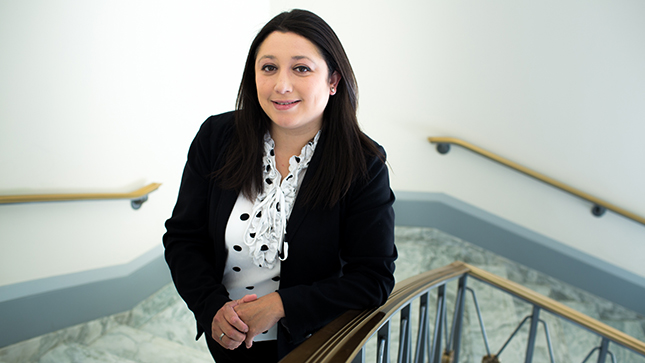
Pili Tobar
Pili Tobar has spent her entire professional life bouncing between Capitol Hill and the activist community fighting for Hispanic empowerment.
The dual perspectives are serving her well as she settles in to her latest role as Hispanic media director for Senate Minority Leader Charles Schumer (D-N.Y.), a spot she landed in January.
“Advocacy and political work go more hand-in-hand than people think,” Tobar said. “And the better you understand the different sides of it, the better you can work to actively effect positive changes.”
Born in Florida and raised in Guatemala, Tobar has packed a lot of resume into her 30 years.
In an activist role, she’s been the spokesperson for America’s Voice and head of advocacy at the Latino Victory Project, where she hit the campaign trail last year on behalf of Hispanic candidates. On the political side, she headed the Hispanic media team for the Democratic National Committee through the 2014 midterm elections. And in 2015, she ran the communications operation for Rep. Ruben Gallego (D-Ariz.).
Given this year’s fights over border security and the fate of ObamaCare — two issues of great consequence to Hispanics — Tobar said she’s happy to be back on Capitol Hill.
In Schumer’s office, her focus is two-fold: First, Tobar is working with senators and Hispanic media outlets to ensure the minority Democrats are communicating effectively with the Latino communities in their states, no matter what the size. And second, she’s fighting to make certain that Hispanic concerns aren’t going ignored in the upper chamber.
Being a Hispanic woman has made her task tougher, Tobar said. But she has a formula for breaking through.
“It’s very easy for people to see you as ‘the angry Latina,’ ” she said. “The lesson that I had to learn very early on was to pick your battles.”
— Mike Lillis
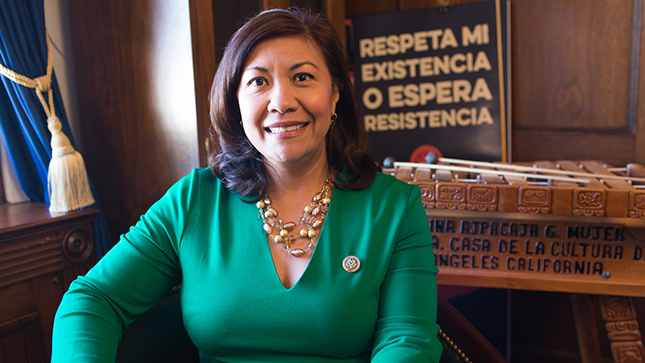
Rep. Norma Torres
Rep. Norma Torres had no interest in politics. Then tragedy struck.
Torres, a sophomore California Democrat, was a 911 dispatcher with the Los Angeles Police Department in the early 1990s when she witnessed, over the phone, a young girl being murdered by her uncle.
“The real tragedy is that she waited 20 minutes for me to answer,” Torres said. “By the time I answered the phone, it was screams.”
The painful episode sent Torres on a quest to boost 911 funding and hire more bilingual dispatchers — a crash course in local politics that spurred her interest in public service, launched her rise to become Pomona’s mayor and then a state senator, and, in 2015, brought her to Washington as the first Guatemalan-American ever to join Congress.
“I learned how to lobby, I learned how to work with the City Council. I learned how to work with my union to help develop the skills that I needed in order to push for changes … with an organization that doesn’t see change as positive,” Torres said.
“That process took me from the soccer mom next door into really looking at myself as more than just that.”
On Capitol Hill, the 52-year-old has been on the front lines of the debate over Central Americans seeking asylum in the U.S., joining former Vice President Joe Biden on a high-profile 2015 trip to her native country. But her roots have also led to difficulties.
“I’m often confused as staff if I don’t have the pin on. It’s very difficult,” she said. “I don’t know if it’s just [being] female, or it’s just the color of my skin.”
A reluctant politician, Torres is still technically on a leave of absence from her dispatcher job.
“If the voters decide to fire me tomorrow, I have something to go back to,” she said. “It keeps me grounded.”
— Mike Lillis
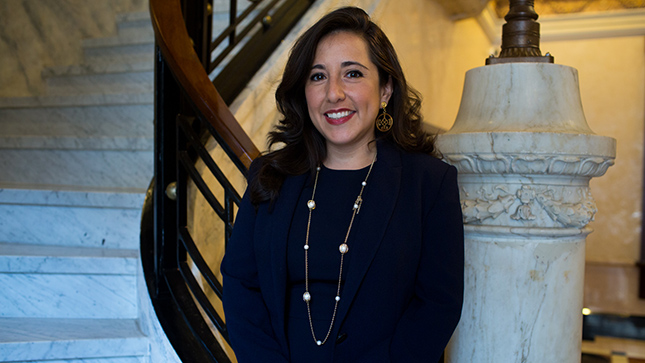
Zuraya Tapia-Hadley
Zuraya Tapia-Hadley’s career is a reflection of the issue she most cares about: the U.S.-Mexico relationship.
Born in Mexico City, Tapia-Hadley grew up in Washington, D.C., where her mother was a diplomat working in the Mexican Embassy.
After high school, Tapia-Hadley went back to Mexico to study law at the Universidad de las Américas Puebla (UDLAP), about two hours southeast of Mexico City.
While at UDLAP, Tapia-Hadley joined an internship program that brought her back to Washington, this time working for then-Rep. Hilda Solis (D-Calif.) in her first term as a member of Congress.
Once she finished her law degree — law school in Mexico is an undergraduate program — Tapia-Hadley came back to Washington to work in an international law firm and to get an LLM at Georgetown University.
But Tapia-Hadley, 37, says she always had an “itch” for working in Congress.
She returned to work for Rep. Nydia Velázquez (D-N.Y.) on the Small Business Committee.
That put her on a path to work for the Hispanic National Bar Association, for the U.S.-Mexico Foundation, at UPS and finally as a principal at The Raben Group.
“It’s all advocacy. It’s the same skill set; it’s the same work. It’s just different constituents,” said Tapia-Hadley.
For Tapia-Hadley, choosing the issues she wants to push for was easy — they’re a part of her personal history.
“A big one is helping Americans understand Mexico … be it trade, economically, socially, culturally. We’re so intertwined but yet so misunderstood,” she said.
“Maybe because I’ve lived it all my life, I want to use all those skills to bridge that divide,” she added.
— Rafael Bernal
Copyright 2023 Nexstar Media Inc. All rights reserved. This material may not be published, broadcast, rewritten, or redistributed. Regular the hill posts









